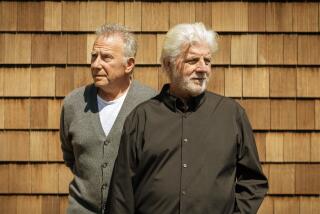Author of ‘Fatal Vision’ Testifies He Feared for Safety of His Family
- Share via
Author Joe McGinniss testified Wednesday that he never let former Army physician Jeffrey MacDonald know that his book, “Fatal Vision,” concluded that MacDonald was a murderer because he feared for his own family’s safety.
MacDonald was out of prison while appealing his 1979 conviction for killing his own family, and MacDonald’s freedom made him “none too comfortable about my own wife and kids, in view of his background, if he were to find out what the book was going to say,” McGinniss said.
Testifying for the first time in his own behalf in MacDonald’s $15-million lawsuit against him, McGinniss said he was also concerned that revealing his disbelief in MacDonald’s innocence would lead the doctor to quit cooperating in the preparation of the book.
Produces Letters
MacDonald claims that McGinniss fraudulently wooed him into continued cooperation long after he had decided to write a critical book. During the trial, MacDonald has produced letters from McGinniss in which the author continually expressed shock at the jury’s guilty verdict.
A key issue in the case has been the precise point at which McGinniss, author of several previous books, including the former best-seller, “The Selling of the President,” made up his mind that the man he had come to know as a friend had murdered his pregnant wife, Colette, and their two daughters.
In his testimony Wednesday, McGinniss insisted that he was not firmly convinced until long after the jury’s verdict, although his opinion had swayed frequently while the manuscript was completed.
“At the moment the verdict came in, what I can remember feeling almost entirely is a sense of terrible shock and sadness--not disbelief. I just felt awful. I felt very, very sad,” he said.
“As time passed, as months and years passed, as I moved further away from the kind of magnetic field of his (MacDonald’s) personality and considered the facts and the evidence, my opinion turned more into a conclusion that he was guilty, that he had indeed killed his wife and children.
“My problem was reconciling the horror of those crimes with the appearance of the man that I knew,” McGinniss said. “It just didn’t seem possible to me that the person I had spent so much time with, had become so close to, could have done those things to those people.”
During cross-examination by MacDonald’s lawyer, Gary Bostwick, McGinniss admitted that he had given a radio interview during the promotional tour for “Fatal Vision” in which he indicated that his “mind was made up at the same time the jury’s mind was made up. . . . At that time, I was convinced beyond a reasonable doubt. . . . The question was, how could he have?”
Expressed Concern
McGinniss also conceded that he had made similar statements to other reporters during the book tour, and had said in his deposition last November that he had “formed an opinion by the end of trial.”
Yet in repeated letters that McGinniss wrote to MacDonald in the months after his conviction, McGinniss expressed concern and dismay over the outcome of the case and signaled his hope that MacDonald’s appeal would be successful.
“I felt every emotion I expressed,” McGinniss told his lawyer, Daniel Kornstein. “I’m not that good a writer to fake something like that. . . . They were honest expressions of feelings I had at the time.”
At the same time, he added, he never told MacDonald that the book would portray him as being innocent of the crimes.
Asked how he could reconcile the letters with his statements to reporters, McGinniss said: “There were certain interviews which made it seem I had formed an opinion a lot sooner and a lot more clearly than I actually had.”
“For one thing,” he said, “I just felt like such a dope that I hadn’t figured it out sooner. I just felt so manipulated. I gave some simplistic, shorthand answers that, no doubt about it, were the way I wished it would have been, rather than the way it was.”
More to Read
Sign up for our Book Club newsletter
Get the latest news, events and more from the Los Angeles Times Book Club, and help us get L.A. reading and talking.
You may occasionally receive promotional content from the Los Angeles Times.






